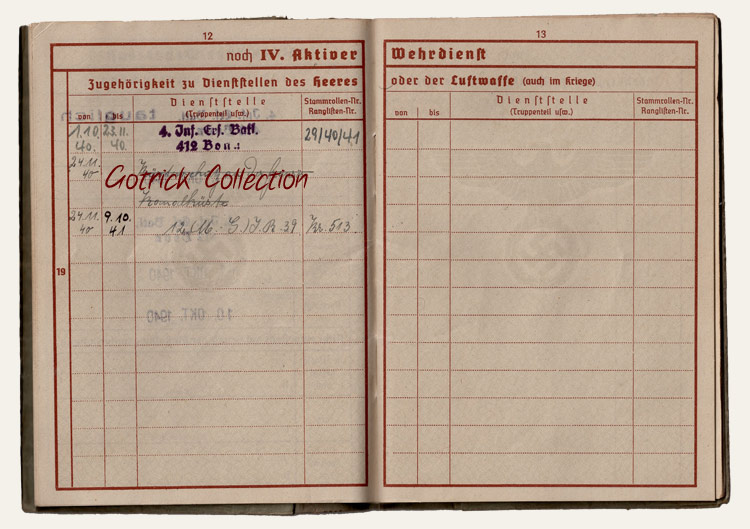Arthur Hillemann

Arthur Hillemann was born on 2 August 1920 in Essen-Kray, Germany.
Arthur was the son of Josef Hillemann and Elisabeth Herzog. Arthur was a catholic and not married.
As profession Arthur was educated as delivery boy. Arthur worked at Friedrich Krupp AG in Essen. What his job was at this heavy indrustrial company is unknown to me. Before and during the war many tons of equipment, vehicles and weapons for the war where being made in the factory. Arthur was a member of the Deutsche Arbeitsfront (DAF), this was a German workers union. On 4 August 1939, at the age of 19, Arthur was drafted for the army at Wehrbezirks-Kommando Essen I. At this recruitment office they decided that Arthur had to do his mandatory labour service with the Reichsarbeitsdienst (RAD) first.
Arthur started his labour service on 15 March 1940. He was part of RAD-Abteilung K 2/71 (L). On 7 April 1940 Arthur was sworn in to the Führer.
Arthur did his RAD service on German soil under the command of the Luftwaffe. After around 5 months, on 19 August 1940, Arthur had fulfilled his labour service and was released from the RAD.

Arthur's payslip total for 1939 at the Krupp factory

Arthur's replacement membership card for the Deutsches Arbeitsfront (Workers union organisation)

The order for Arthur to do his Reichsarbeidsdienst duty first




After some weeks of rest Arthur's army service would start. On 1 Oktober 1940 he arrived at Infanterie-Ersatz-Bataillon 412 in Bonn, Germany. On 4 Oktober they did a medical check and deemed Arthur fit for service. On 10 Oktober Arthur was again sworn in to the Führer. Arthur was assigned to the 4th company of this training Regiment. This was the heavy weapons company. Arthur was trained on the standart K98k rifle and the MG34 in its heavy MG configuration with the tripot. In other words he was trained as heavy machinegun soldier. Arthur also received training in the use of the fieldradio.



As Arthur had done basic training while with the RAD, he only received 7 weeks of training at his Ersatz unit. On 22 November his Ersatz Bataillon did a medical check. They deemed Arthur fit but noted that he had curved teeth and a problem with his left knee. After the medical check, Arthur was send to a combat unit. This was to be Infanterie-Regiment 39, part of the 26.Infanterie-Division. This unit had just taken part in the invasion of Belgium and France earlier this year. Arthur was assigned to the 12.Kompanie. This was the heavy weapons company of the III.Bataillon of the Regiment. His unit was doing occupation duty's in north-France and Belgium till May 1941, when the Division moved to eastern Poland. Arthur's Regiment was placed at Rhein, southwest of Lötzen in east-Prussia. During May they performed exercises on Bataillon level. In early June 1941 the Regiment was moved to the area of Merunen. At 19 and 20 June the Regiment moved closer to the Russian border. On 19 June they went to the area of Catharinenhof and on 20 June the area of Zapfengrund.


On 22 June 1941 the Division crossed the Russian border at Suwalki and participated in Operation Barbarossa, the invasion of Russia.
The Division was part of VI.Armee-Korps of the 9.Armee under Heeresgruppe Mitte. The Division participated in the attacks towards Moscow.
Arthur was the gunner of a heavy MG in his unit. According to the Divisional diary there were multiple heavy attacks by the Russians on the positions of Arthur's III.Bataillon in early August 1941. Arthur must have been brave during these attacks as he was promoted to Gefreiter (private first class) and received the Eisernes-Kreuz II klasse on the 16th.

The German forces continued to advance into Russia. On 9 Oktober 1941 Arthur's Regiment attacked the town Dudkino. During daylight the German units couldn't conquer Dudkino. Only Arthur's III.Bataillon was able to make some progress. When the evening arrived with its darkness, the Regiment was able to enter Dudkino. But it took all night to capture the town. The Russians mounted multiple heavy counter-attacks to regain Dudkino, but the German forces managed to hold them off. During these battles for Dudkino Arthur died. On the 20th of Oktober 1941 Arthur's company leader, a Leutnant, wrote a letter to Arthur's parents. In this letter the Leutnant praises the brave and loyal deeds of Arthur. He wrote that Arthur had died on 10 Oktober 1941 at Dudkino. According to his Wehrpass Arthur had died on 9 Oktober. Which day is correct is unknown to me, but it might be that Arthur had died during the night attacks at Dudkino.






Enhanced remembrance photo of Arthur




